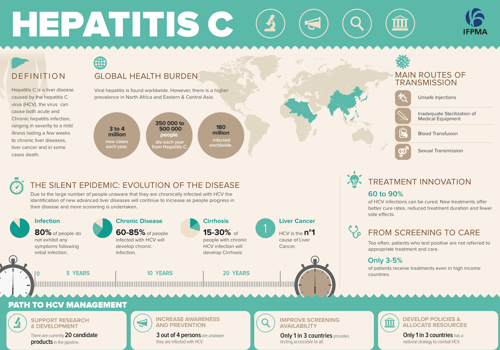The silent epidemic – Tackling a viral time bomb
28.07.14

World Hepatitis Day presents an important opportunity for us to put the spotlight on this specific disease, and highlight significant existing shortfalls in plugging unmet medical needs.
In particular, the Hepatitis C Virus (HCV) is a serious global health issue, dubbed a ‘viral time bomb’ by the World Health Organiation (WHO) due to its high prevalence, long-term disease progression, ageing population, and low diagnosis and treatment rates.
In Europe alone about 15 million people are estimated to be chronically infected by hepatitis C and at risk of serious long-term complications such as cirrhosis, cancer and liver transplant. These all have the potential to place a significant detriment not only on the quality of human life, but also on society and the economy at large.
Check out the infographic from the IFPMA that details the scale of the human impact of hepatitis C.
There is still no vaccine today to protect against hepatitis C infection, and the sheer complexity of the disease – which comes in up to 6 different forms or “genotypes” – means that some groups of patients are left facing a shortage of therapeutic options and life-threatening difficulties such as intolerance or resistance to treatment, a need for longer duration of treatment, or drug-drug interactions in the case of co-infections.
As the numbers continue to grow, so will the cost of not treating hepatitis C. For governments and budget holders, effective treatment and care have a crucial role to play in addressing the financial implications of the disease. As the Scottish National Plan for hepatitis C found out, increasing treatment uptake can actually help attain greater cost effectiveness and decrease the overall cost of the disease by preventing chronic patients from reaching the most serious stages of the disease.
This is why the breakthrough medical innovation that our industry is bringing to life is today more than ever needed. The current public debate around new medicines for hepatitis C is extremely polarised (as noted here last month by EFPIA’s Director General, Richard Bergström). We need to break this deadlock and find new ways to communicate the genuine value that we are effectively delivering for patients in the first instance, but also the forecast benefits for national economies and health systems across Europe.
